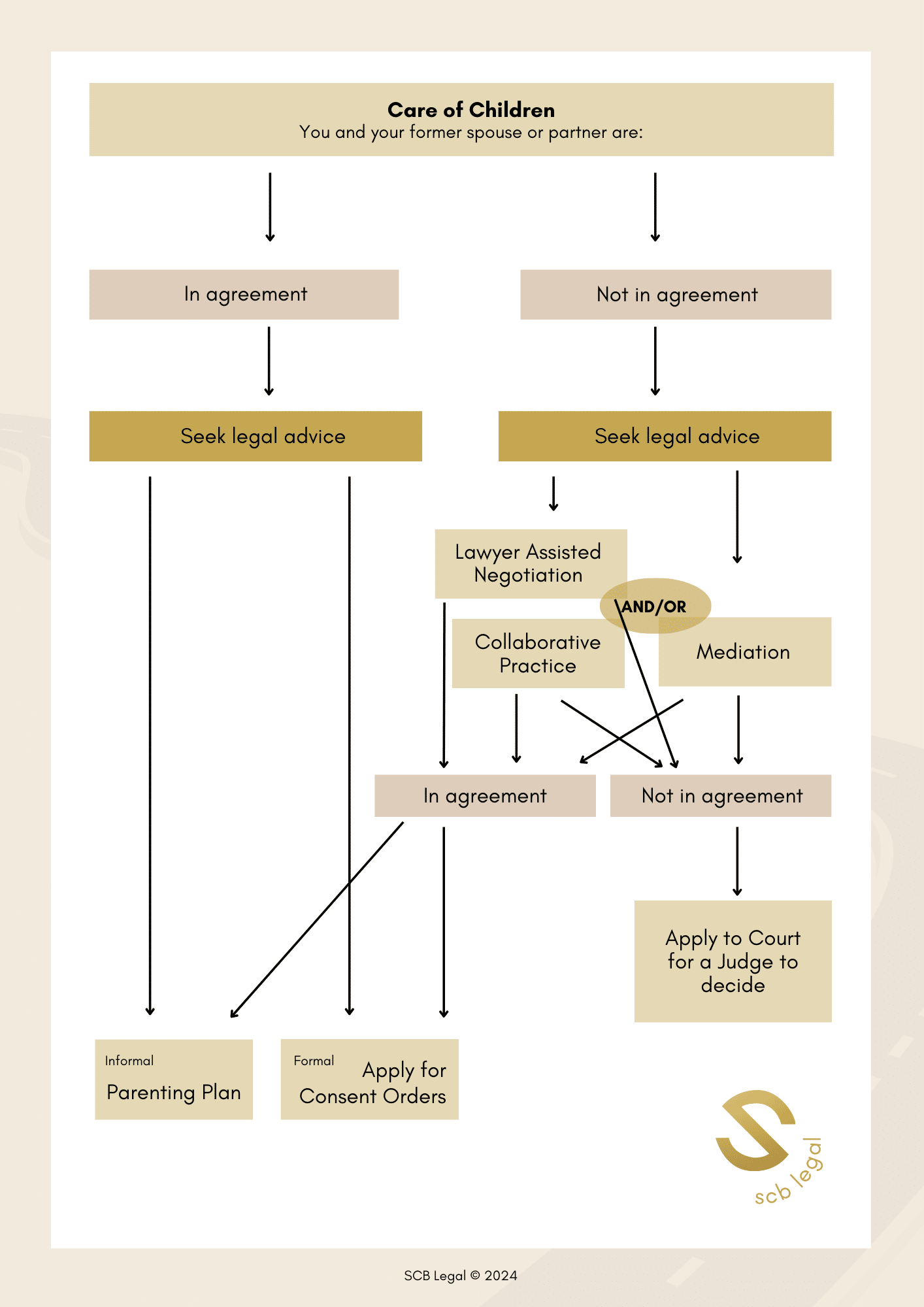Table of Contents
There’s a significant amount of misinformation given to people in disagreement with their ex partner or spouse about how to divide money and property and relating to the care of their children, amongst other issues.
On this page, you will learn the family law dispute resolution options available here in Australia, including the steps and processes that may be ahead of you. The good news? It’s unlikely you will need to go to Court. But there is something equally problematic to be aware of, which will become clearer as you read on.
Family Law Dispute Resolution Pathways
If staying out of Court is your goal, the avenues available to do that include:
- Negotiation
- Collaborative Practice
- Mediation
- Arbitration
Negotiation
Negotiation is best explained as back and forth offering of agreement terms that should take into account what, if the matter were to ever end up in Court, the outcome would likely be, based on family law and your specific circumstances.
You may have already commenced independent negotiations without any success. If that’s the case, the best approach for a timely resolution is to seek legal advice to guide your next steps.
Advice from a family lawyer helps people make the right decisions from the get-go, which goes a long way in helping minimise the risk of new issues and further costs. For some of our clients, the initial advice may be enough to assist the next attempt at independent negotiations. Alternatively, some people benefit from communication and negotiation being conducted through their family lawyer, especially where communication is very poor or harmful.
Collaborative Practice
Collaborative practice is a process where both parties, along with their lawyers and sometimes other professionals such as financial planners or child psychologists etc, all work together to achieve a resolution that you can both live with. Here, the parties sign an agreement that they will not commence Court proceedings.
Imagine a round table meeting where the goal is for you, your ex and each of your family lawyers to calmly come to an agreement that is suitable to both parties, with the benefit of negotiations taking place in person (or face to face online). This process may involve multiple meetings until you can reach an agreement.
Importantly, this family law dispute resolution approach is not suitable for everyone. Both must have a desire to negotiate respectfully and be genuine about wanting to avoid Court. We find that a Collaborative approach can be particularly beneficial where the intention is to have some type of relationship with your ex. For example, if you have children and wish to be amicable and pleasant when you come into contact with them throughout your children’s lifetime.
Mediation
Mediation is where a neutral third party (a mediator) helps disputing parties reach an agreement. Mediation is conducted to resolve the issues in dispute that are preventing the parties from reaching an agreement about property settlement or parenting arrangements (or both).
Mediation is typically a half day or full day process, depending on the number of issues in dispute. The goal is to reach an agreement during that time. Depending on where you are doing mediation, you can elect to have a lawyer with you at the mediation to have on hand for advice, or you may choose to participate without a lawyer. The mediator is there to facilitate discussions but will not be able to give you legal advice.
Mediation is a required step that must be completed before any Family Law dispute involving children can go to Court. It is also strongly recommended for matters involving property. It is designed to protect people from the additional stress, cost and time delays that going to Court adds. It also assists in helping the Court focus on cases that are more urgent such as child protection and family violence matters etc. Where there are concerns about your safety or wellbeing, alternative arrangements to avoid being in the same room as your ex can be made on a case by case basis.
Arbitration
Arbitration is a more costly avenue than others. It is less common, but it is often faster than the Court process if attempts at mediation have been unsuccessful. Unlike a mediator, an Arbitrator makes a decision for you.
Liken this process to the Court process, only private. That is, the facts are presented, the law taken into account, questions/cross examination takes place, ending with a Judgement made by the Arbitrator. The downside of this pathway, just like Court, is that any decision making power is taken away from both of you.
On the other hand, the benefit of arbitration is that it is generally a much faster and less expensive process than Court. The process is also confidential.
Once the decision is made by the Arbitrator, it is final. For some people, this can mean they get a worse outcome than if they’d been more flexible in their prior negotiations.
The Issues in Dispute
To see how the dispute resolution process works in Australia, below are some diagrams to make it easier to understand, specific to parenting arrangements and financial settlements.
Parenting Arrangements
Here’s a big picture view of the steps involved in the process of getting an outcome in relation to the care of any children you have together in Australia:
Family Law Dispute Resolution Options For The Care of Children

Early family law advice, specific to the ages and needs of any children you have, and your financial situation, is essential.
Finances & Dividing Assets: The Property Settlement Process
Here’s a big picture view of the steps involved in finalising a dispute relating to a financial/property settlement in Australia:
Family Law Dispute Resolution Options For Finances & Dividing Assets:
The Property Settlement Process

If the issues in dispute are different to those above, such as who will stay in the family home or who will pay for additional expenses such as extracurricular sports or private health insurance for the children, then the default step is to seek legal advice, even if that means only one appointment.
Even for people in agreement, seeking independent legal advice is important. Why? Because you need to be aware of any issues that could arise later on, that non-family lawyers couldn’t possibly know. There are always potential risks – you must know what they are first. Once you’re aware, you can then confirm the decision or revisit some elements of the agreement to eliminate the risks you’re not prepared to take, or at least reduce them.
Where Are You Getting Your Advice From?
Whether you’re asking others who’ve been through this before you or you’re being given advice by well-intentioned friends and family, please exercise caution.
Be aware that there have been significant changes in how the Court manages disputes over the last few years. And, if you’re hearing from people who’ve had particularly poor experiences, listen to their experiences but also know that some outcomes they faced may have been avoidable had they sought the right advice.
We know that many separated people believe that seeking a lawyer’s advice early is like a red flag signalling they are saddling up for a fight. For some people, that may be the intention but for most, it’s not.
The other misconception is that seeing a lawyer is for ‘later on’, the goal being to minimise legal costs. What tends to eventuate sadly though, is the exact outcome they were trying to avoid.
The people who typically avoid the more expensive and more stressful separation and divorce settlements are those who get family law advice early. It accurately informs them about obligations, entitlements and so on, specific to their circumstances.
Finally, over the last few years, there have been significant changes to how the Court manages disputes and currently, the data shows that about only 3% of disputes relating to parenting related matters end up in Court. While that sounds like good news, it is, but only in part because those stats don’t take into account the disputes that go on until just before the matter is due to be heard in Court. For some people, that is up to two or more years of negotiating or waiting, meaning that other parts of their lives are on hold too, as a result.
So, while the goal is to avoid Court, it’s also to avoid the long, costly and emotionally exhausting road that can arise when even the most amicable of separations hit a few unforeseen potholes in what should have been a far smoother road.
Related: For more information about family dispute resolution options, including care arrangement options for children, read this page which provides more detail about the two options.
Want to know who should pay what upon separation? Read this page about who should pay the bills and mortgage etc upon separation.
If you want the best chance at making decisions that won’t come back to bite you later on, or you wish to avoid Court, reach out to our experienced team.
We can help you wherever you are based in Sydney. We have two office locations – Penrith & Blacktown – as well as phone and online consultations if preferred. Reach out to our team on 02 47 222 050.
Disclaimer: The content in this article provides general information however it does not substitute legal advice or opinion. Information is best used in conjunction with legal advice from an experienced member of our team.

